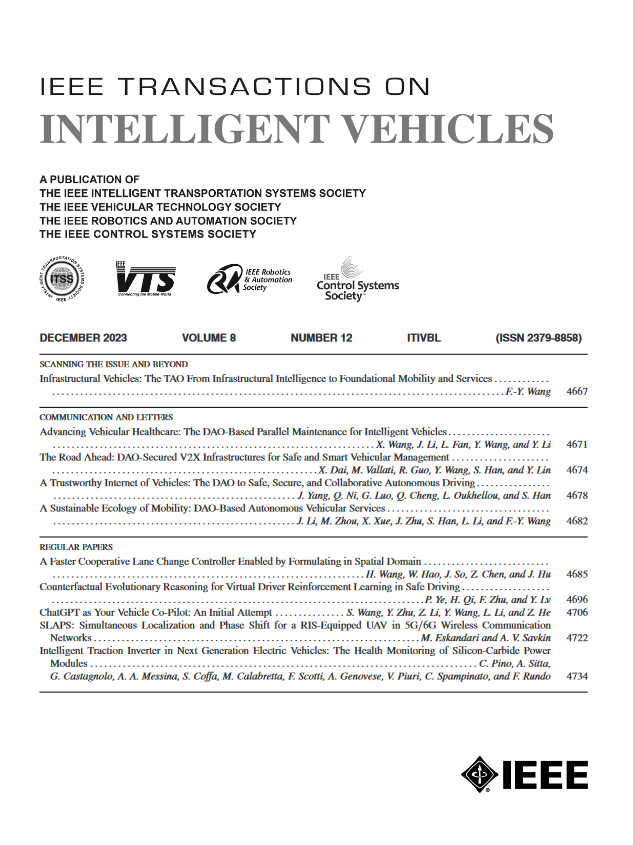Human-Inspired Autonomous Racing in Low Friction Environments
IF 14.3
1区 工程技术
Q1 COMPUTER SCIENCE, ARTIFICIAL INTELLIGENCE
引用次数: 0
Abstract
Low friction surfaces such as ice and snow pose a significant challenge for autonomous vehicle maneuvering due to the limited available traction. While some prior works have successfully controlled a vehicle up to the friction limit, generalized autonomous driving in these conditions remains an open problem. Skilled human drivers, however, display exceptional vehicle control in these challenging environments. In particular, rally drivers operate with large sideslip angles and high tire slip to achieve their objective of minimizing time. We directly compare a professional human driver and state-of-the-art autonomous racing controller to reveal dramatic differences in state- and input- space utilization. Inspired by these ideas, we present a motion planning and control framework for autonomous racing in low friction environments. We first develop a vehicle model to capture the dynamics associated with high slip maneuvering. Then, we implement nonlinear model predictive control for online, time optimal trajectory generation. Experimental validation on a frozen lake testing track using a Volkswagen Golf GTI reveals the ability to safely operate beyond limits of conventional vehicle safety systems. The utility of this increased maneuverability is demonstrated when the controller is able to recover from a significant, unexpected disturbance to the yaw dynamics. These results suggest that autonomous vehicles, like skilled human drivers, can leverage increased slip to improve robustness in low friction environments.低摩擦环境中人类启发的自动驾驶赛车
由于可用牵引力有限,冰雪等低摩擦表面对自动驾驶汽车的操纵构成了重大挑战。虽然之前的一些研究已经成功地控制了车辆的摩擦极限,但在这些条件下的广义自动驾驶仍然是一个悬而未决的问题。然而,熟练的人类驾驶员在这些充满挑战的环境中表现出卓越的车辆控制能力。特别是,拉力赛车手操作大侧滑角和高轮胎打滑,以达到他们的目标,尽量减少时间。我们直接比较了专业的人类驾驶员和最先进的自动赛车控制器,以揭示状态和输入空间利用率的巨大差异。受这些想法的启发,我们提出了一个运动规划和控制框架,用于低摩擦环境下的自动赛车。我们首先开发了一个车辆模型来捕捉与高滑移机动相关的动力学。然后,对在线、时间最优轨迹生成实现非线性模型预测控制。使用大众高尔夫GTI在冰冻湖测试轨道上进行的实验验证表明,该系统能够超越传统车辆安全系统的限制进行安全操作。当控制器能够从一个重大的、意想不到的偏航动力学干扰中恢复时,这种增加的机动性的效用就被证明了。这些结果表明,自动驾驶汽车就像熟练的人类驾驶员一样,可以利用增加的滑移来提高低摩擦环境下的稳健性。
本文章由计算机程序翻译,如有差异,请以英文原文为准。
求助全文
约1分钟内获得全文
求助全文
来源期刊

IEEE Transactions on Intelligent Vehicles
Mathematics-Control and Optimization
CiteScore
12.10
自引率
13.40%
发文量
177
期刊介绍:
The IEEE Transactions on Intelligent Vehicles (T-IV) is a premier platform for publishing peer-reviewed articles that present innovative research concepts, application results, significant theoretical findings, and application case studies in the field of intelligent vehicles. With a particular emphasis on automated vehicles within roadway environments, T-IV aims to raise awareness of pressing research and application challenges.
Our focus is on providing critical information to the intelligent vehicle community, serving as a dissemination vehicle for IEEE ITS Society members and others interested in learning about the state-of-the-art developments and progress in research and applications related to intelligent vehicles. Join us in advancing knowledge and innovation in this dynamic field.
 求助内容:
求助内容: 应助结果提醒方式:
应助结果提醒方式:


